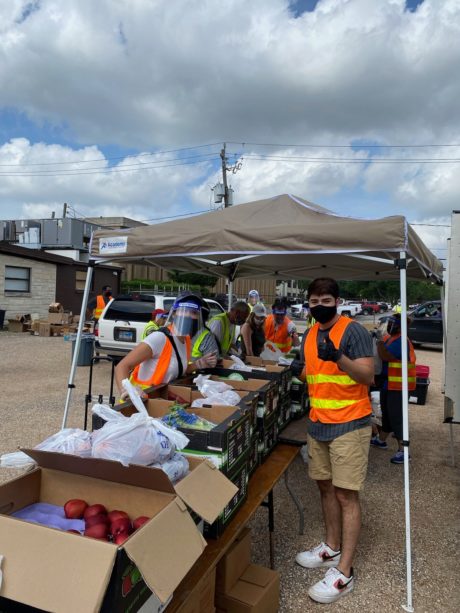
Congregations in the Episcopal Diocese of Texas are now taking steps to gather in person while also continuing their on-line worship, studies and fellowship. Since January, EHF’s congregational engagement team has been visiting clergy and lay leaders about their pandemic experience, how their community-engaged outreach has shifted over the past year, and listening to their hopes and dreams for 2021 as they move into this transitional time. On Zoom or by phone, everyone has been gracious and generous with their time, and everyone is hopeful with the increasing vaccination rate to return to more in-person gatherings by the fall.
From the early days of the COVID-19, many congregations deepened their food ministries responding to the ongoing immediate needs of their neighbors. St. James, Austin flipped their model by partnering with a food delivery business to have groceries sent to the doorsteps of their regular Welcome Table patrons. San Pedro in Pasadena and San Pablo, Houston hosted regular drive by food distribution for neighbors and the dWELLing ministry of St. Stephen’s in Liberty pivoted their community celebration gatherings to a city wide food distribution site. In Angleton, the Peach Street Farmers Market ministry of Holy Comforter quickly self organized a drive thru farmers market and after a few weeks had protocols in place for a safe, in-person reopening. The majority of congregations have maintained or increased their monetary giving to local food banks and nonprofit partners.
“We can’t wait to get the band back together” is a sentiment we are hearing again and again. While all are anxious to return to face-to-face worship and relationships in their communities, many are also aware of the toll the pandemic has taken and that should not be ignored. The Rev. Rhonda Rogers, Rector of St. Francis of Assisi, Prairie View cautioned against glossing over this extended crisis in an effort to get back to normal.
“We need to take time and make space for people to grieve and to be attentive to the many losses people have suffered during this time,” she said.
Many leaders we have spoken to share in this need to acknowledge the loss of loved ones, income, homes and other life altering hardships that need to be processed.
The Rev. Jan Halstead, deacon at Christ Church in Cedar Park, shared that the pandemic has greatly impacted their broadly partnered mental health initiative they have developed over the past 3 years. “With providers shifting to teletherapy, so many of our neighbors who didn’t have easy access to mental health services previously are now connected to the care they needed using their phones,” Halstead said.
Halstead also shared about the many staffing changes their community partners have had over the past year. “We continue to be in touch with our partners and we are hopeful to deepen some of those relationships, but I am aware that we will need to re-establish connections and likely re-envision our work,” she said.
During the next eight months, EHF will be responding to these on-going conversations with opportunities for congregations to address wellness, mental health, re-engage neighbors and identify paths forward for imagining or re-imagining a community-based ministry. These offerings will be posted on the EHF Learning Opportunities page and the EHF Churches Facebook page.